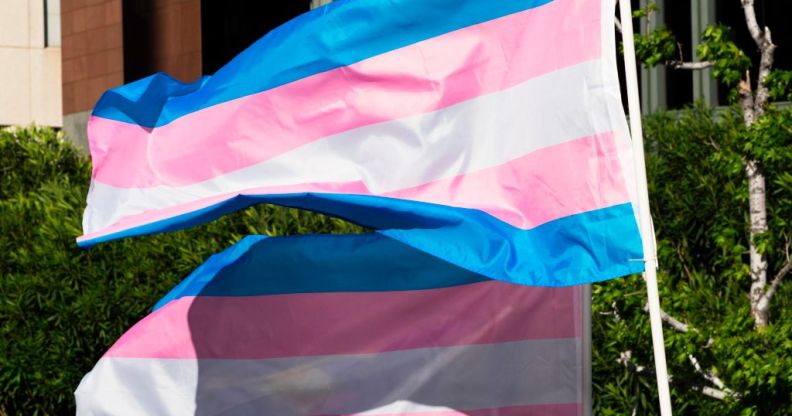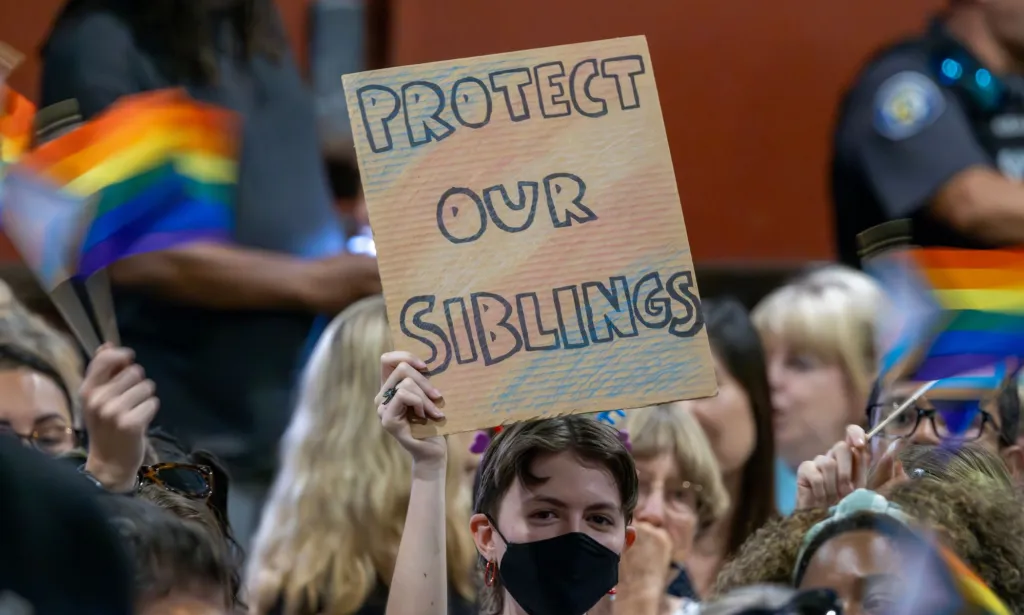Tennessee teens ask Supreme Court to block trans healthcare ban: ‘I’m fighting this’

Trans teens in Tennessee are taking their state’s ban on gender affirming care for minors to the Supreme Court. (ROBYN BECK/AFP/Getty)
Transgender teenagers from Tennessee are formally asking the US Supreme Court to consider blocking their state’s ban on gender-affirming healthcare for minors.
Accompanied by their parents, a doctor, and the state ACLU (American Civil Liberties Union), the three teens asked the Supreme Court on Wednesday (1 November) to block the ban which would put restrictions on trans minors’ access to puberty blockers and hormone therapy.
Last month a lower court, the 6th US Circuit Court of Appeals, allowed for gender-affirming healthcare for minors bans to remain in effect in both Tennessee and Kentucky.

In Tennessee, the ban punishes healthcare providers who offer gender-affirming care to minors with a $25,000 penalty.
It also includes a phase-out period by 31 March 2024 for those who are currently receiving now-banned gender-affirming care.
If the Supreme Court agrees to hear this case, it will mark the first time it has considered a restriction on puberty blockers, hormone therapy, and surgery for minors.
One of three teens petitioning the Supreme Court, identified only as L.W., said: “I’m fighting this law because I know how important this care is for tens of thousands of transgender youth like me.
“It scares me to think about losing the medication that I need and if this law continues, my family may have to leave Tennessee – the place I have lived and loved my entire life.
The 15-year-old transgender girl continued, per NBC News: “And with so many new laws like Tennessee’s, it is hard to imagine where we can even go. I want the justices to know transgender people are not going away and that we deserve the same rights as everyone else.”

Lucas Cameron-Vaughn, staff attorney for the ACLU of Tennessee added in a statement: “Over the past few months this vicious law has already had a disastrous impact in homes and communities across Tennessee.
“Families are losing access to much-needed medical care that has allowed their children to flourish.
“This law denies these families’ dignity and signals to their children that they do not have the freedom to lead healthy and happy lives.”
The ACLU writes in this week’s petition that the Circuit Court of Appeals “broke with numerous precedents of this Court” when they allowed for the ban to remain.
It also notes that the ban violates the 14th Amendment’s equal protection clause by discriminating, as cisgender children may still access treatment that trans youth are banned from in order to treat other conditions.
Additionally, it violates the 14th Amendment’s due process clause, which promises parents the right to make decisions concerning the medical care of their children.
The ACLU argues that the Circuit Court’s ruling has created “legal uncertainty” regarding healthcare for trans youths, “creating chaos across the country for adolescents, families, and doctors.”
Kentucky attorneys representing trans minors affected by their state’s gender-affirming care ban also plan to petition the Supreme Court this week.
Both states are now among 22 US states in which bans on gender-affirming care for minors have become law, despite widespread support for gender-affirming care for both minors and adults among the medical community.
All major medical associations, including the American Medical Association, the American Academy of Pediatrics and the American Psychological Association, have publicly stated their opposition to such state bans, while countless studies have proven that gender-affirming care reduces suicidality and improves mental health.

